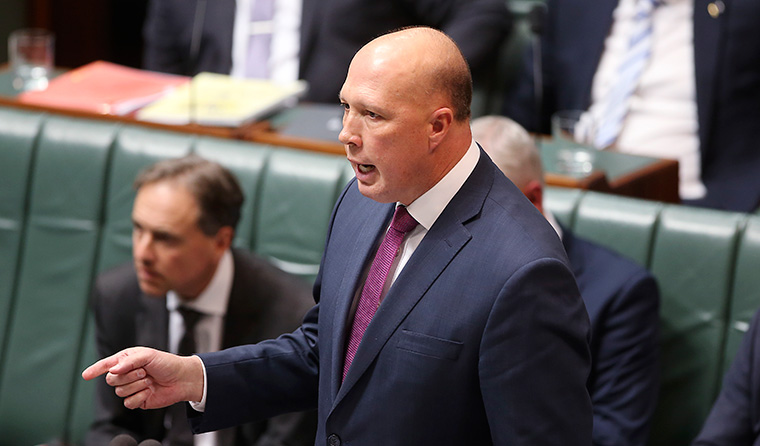News
Peak medical bodies united in support of Medevac law
The RACGP has joined medical colleges around Australia in calling on Federal Parliament to maintain existing laws.
 More than 130 people have been transferred from Nauru and Papua New Guinea since the laws were passed in February. (Image: AAP)
More than 130 people have been transferred from Nauru and Papua New Guinea since the laws were passed in February. (Image: AAP)
With a parliamentary committee set to this week release a report from its inquiry into the Medevac bill, Australia’s peak medical bodies have called on senators to block the Federal Government’s bid to repeal the legislation.
‘Every person should have access to necessary and appropriate medical care and, as clinicians, we have a duty to uphold this basic human right,’ the 11 major Australian medical colleges wrote in a joint statement.
‘The Medevac legislation has improved access to appropriate healthcare for refugees and asylum seekers being held offshore. It allows medical experts to make decisions about healthcare for seriously ill individuals and ensure that they receive the medical treatment that they need in a clinically appropriate timeframe.
‘Previous delays and failures to transfer ill asylum seekers resulted in preventable suffering.
‘We call on the Australian Parliament to maintain the standard of healthcare and information that has now been achieved through the Medevac legislation.’
The existing legislation – formally known as the Home Affairs Legislation Amendment (Miscellaneous Measures) Bill 2018 – allows the temporary transfer of patients in offshore detention centres for treatment or assessment.
More than 130 people have been transferred from Nauru and Papua New Guinea since the laws were passed in February.
‘That means that there were 130 people who required urgent medical treatment who have now received that treatment who otherwise would probably not have received that treatment,’ of the Australian and New Zealand College of Anaesthetists President Dr Rod Mitchell told SBS News.
The Federal Opposition is also in favour of maintaining the current legislation.
‘Labor stands by these laws and supports them,’ opposition frontbencher Kristina Keneally said on the ABC’s Insiders on the weekend. ‘We stand with the doctors in noting that Medevac is ensuring that people who are sick are able to get the medical treatment that they need.’
Federal Home Affairs Minister Peter Dutton has said the existing rules are being exploited by asylum seekers who were being encouraged to self-harm in order to make it to Australian shores.
‘People have come to our country, people have self-harmed on advice from some of the refugee groups or advocates. People have self-harmed in significant numbers,’ Minister Dutton said last month. ‘They’ve done that because of this bill.’

The Department of Home Affairs is yet to provide evidence of Peter Dutton’s suggestion that asylum seekers are exploiting the system. (Image: AAP)
Independent Senator Cory Bernardi, who is in favour of a repeal, also believes the system is being exploited.
‘Quite frankly, the Medevac legislation has been misused and abused, just as it was identified as it was vulnerable to at the point in time,’ Senator Cory Bernardi said.
‘So ultimately we have to look after the Australian people, we have to look after our way of life, we have to make sure we protect our borders from threats foreign and domestic.’
Supporters, however, agree with the assessment of Australia’s clinicians.
‘We would have a situation where doctors, peak medical bodies, are saying that this law should stay because it is helping people, and you’ve got the Minister and the Government ignoring what the doctors’ advice is,’ Greens Senator Sarah Hanson-Young told reporters.
‘I’ll back the doctors over Peter Dutton any day.’
The Australian medical bodies asking Australian Parliament to maintain the Medevac legislation are the:
- Australasian College for Emergency Medicine (ACEM)
- Australasian College of Dermatologists (ACD)
- The Australian College of Rural and Remote Medicine (ACRRM)
- Australian and New Zealand College of Anaesthetists (ANZCA)
- College of Intensive Care Medicine of Australia and New Zealand (CICM)
- Royal Australasian College of Physicians (RACP)
- Royal Australasian College of Medical Administrators (RACMA)
- Royal Australian College of General Practitioners (RACGP)
- Royal Australian and New Zealand College of Obstetricians and Gynaecologists (RANZCOG)
- Royal Australian and New Zealand College of Psychiatrists (RANZCP)
- Royal Australian and New Zealand College of Radiologists (RANZCR).
asylum seekers Medevac refugee health
newsGP weekly poll
Health practitioners found guilty of sexual misconduct will soon have the finding permanently recorded on their public register record. Do you support this change?